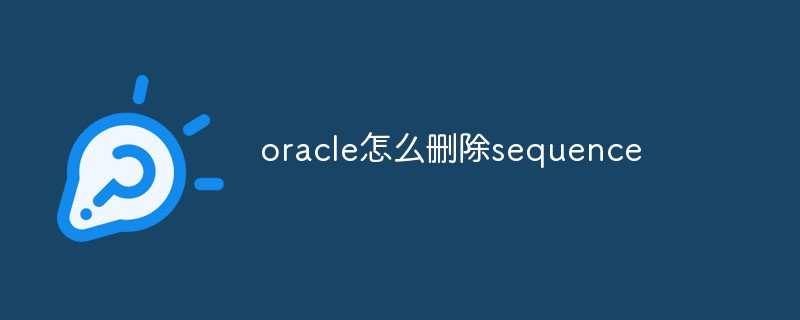Oracle lock table situations include: 1. Program A performs an insert on tableA, but before commit, program B also performs an insert on tableA. At this time, a resource busy exception will occur, which is a table lock. ; 2. Table locking often occurs in concurrency rather than parallelism. In parallel, when one thread operates the database, the other thread cannot operate the database. CPU and I/O allocation principles.

The operating environment of this tutorial: Windows 10 system, Oracle version 19c, Dell G3 computer.
The main reasons for locking tables are:
1. Program A performs an insert on tableA, but before commit, program B also performs an insert on tableA. At this time, an exception that the resource is busy will occur, which is the lock table
2. The lock table often occurs in concurrency rather than parallelism (in parallel, when one thread operates the database, the other thread cannot operate the database, cpu and i/o allocation principle)
Methods to reduce the probability of locking the table:
1. Reduce the time between the execution of insert, update, and delete statements and commit. Specifically, change batch execution to single execution and optimize the non-execution speed of sql itself
2. Roll back things if there is an exception
The reason for locking the table may be that the row data has been modified and forgotten to submit , will also cause table locking.
1. It is recommended to check the reason before making a decision when locking the table.
1. The code for lock table query has the following form:
select count(*) from v$locked_object; select * from v$locked_object;
2. Check which table is locked
select b.owner,b.object_name,a.session_id,a.locked_mode from v$locked_object a,dba_objects b where b.object_id = a.object_id;
3. Check which session caused it
select b.username,b.sid,b.serial#,logon_time from v$locked_object a,v$session b where a.session_id = b.sid order by b.logon_time;
4. Check which sql is causing it
select b.username,b.sid,b.serial#,c.* from v$locked_object a,v$session b,v$sql c where a.session_id = b.sid and b.SQL_ID = c.sql_id and c.sql_id = '' order by b.logon_time;
5. Kill the corresponding process
Execute the command: alter system kill session'1025,41';
Among them, 1025 is sid and 41 is serial#.
2. The reason why Oracle users are often locked
prompts when logging in: test user is locked
1. Use the dba role Log in as a user to unlock. First set the specific time format to view the specific time
SQL> alter session set nls_date_format=‘yyyy-mm-dd hh24:mi:ss’;
Session altered.
2. View the specific locked time
SQL> select username,lock_date from dba_users where username='TEST'; USERNAME LOCK_DATE ------------------------------ ------------------- TEST 2021-03-10 08:51:03
3. Unlock
SQL> alter user test account unlock;
User altered.
The above is the detailed content of When does Oracle lock a table?. For more information, please follow other related articles on the PHP Chinese website!
 什么是oracle asmApr 18, 2022 pm 04:16 PM
什么是oracle asmApr 18, 2022 pm 04:16 PMoracle asm指的是“自动存储管理”,是一种卷管理器,可自动管理磁盘组并提供有效的数据冗余功能;它是做为单独的Oracle实例实施和部署。asm的优势:1、配置简单、可最大化推动数据库合并的存储资源利用;2、支持BIGFILE文件等。
 oracle怎么查询所有索引May 13, 2022 pm 05:23 PM
oracle怎么查询所有索引May 13, 2022 pm 05:23 PM方法:1、利用“select*from user_indexes where table_name=表名”语句查询表中索引;2、利用“select*from all_indexes where table_name=表名”语句查询所有索引。
 oracle全角怎么转半角May 13, 2022 pm 03:21 PM
oracle全角怎么转半角May 13, 2022 pm 03:21 PM在oracle中,可以利用“TO_SINGLE_BYTE(String)”将全角转换为半角;“TO_SINGLE_BYTE”函数可以将参数中所有多字节字符都替换为等价的单字节字符,只有当数据库字符集同时包含多字节和单字节字符的时候有效。
 Oracle怎么查询端口号May 13, 2022 am 10:10 AM
Oracle怎么查询端口号May 13, 2022 am 10:10 AM在Oracle中,可利用lsnrctl命令查询端口号,该命令是Oracle的监听命令;在启动、关闭或重启oracle监听器之前可使用该命令检查oracle监听器的状态,语法为“lsnrctl status”,结果PORT后的内容就是端口号。
 oracle怎么删除sequenceMay 13, 2022 pm 03:35 PM
oracle怎么删除sequenceMay 13, 2022 pm 03:35 PM在oracle中,可以利用“drop sequence sequence名”来删除sequence;sequence是自动增加数字序列的意思,也就是序列号,序列号自动增加不能重置,因此需要利用drop sequence语句来删除序列。
 oracle怎么查询数据类型May 13, 2022 pm 04:19 PM
oracle怎么查询数据类型May 13, 2022 pm 04:19 PM在oracle中,可以利用“select ... From all_tab_columns where table_name=upper('表名') AND owner=upper('数据库登录用户名');”语句查询数据库表的数据类型。
 oracle查询怎么不区分大小写May 10, 2022 pm 05:45 PM
oracle查询怎么不区分大小写May 10, 2022 pm 05:45 PM方法:1、利用“LOWER(字段值)”将字段转为小写,或者利用“UPPER(字段值)”将字段转为大写;2、利用“REGEXP_LIKE(字符串,正则表达式,'i')”,当参数设置为“i”时,说明进行匹配不区分大小写。
 Oracle怎么修改sessionMay 13, 2022 pm 05:06 PM
Oracle怎么修改sessionMay 13, 2022 pm 05:06 PM方法:1、利用“alter system set sessions=修改后的数值 scope=spfile”语句修改session参数;2、修改参数之后利用“shutdown immediate – startup”语句重启服务器即可生效。

Hot AI Tools

Undresser.AI Undress
AI-powered app for creating realistic nude photos

AI Clothes Remover
Online AI tool for removing clothes from photos.

Undress AI Tool
Undress images for free

Clothoff.io
AI clothes remover

AI Hentai Generator
Generate AI Hentai for free.

Hot Article

Hot Tools

SublimeText3 Mac version
God-level code editing software (SublimeText3)

SAP NetWeaver Server Adapter for Eclipse
Integrate Eclipse with SAP NetWeaver application server.

Atom editor mac version download
The most popular open source editor

mPDF
mPDF is a PHP library that can generate PDF files from UTF-8 encoded HTML. The original author, Ian Back, wrote mPDF to output PDF files "on the fly" from his website and handle different languages. It is slower than original scripts like HTML2FPDF and produces larger files when using Unicode fonts, but supports CSS styles etc. and has a lot of enhancements. Supports almost all languages, including RTL (Arabic and Hebrew) and CJK (Chinese, Japanese and Korean). Supports nested block-level elements (such as P, DIV),

SecLists
SecLists is the ultimate security tester's companion. It is a collection of various types of lists that are frequently used during security assessments, all in one place. SecLists helps make security testing more efficient and productive by conveniently providing all the lists a security tester might need. List types include usernames, passwords, URLs, fuzzing payloads, sensitive data patterns, web shells, and more. The tester can simply pull this repository onto a new test machine and he will have access to every type of list he needs.






